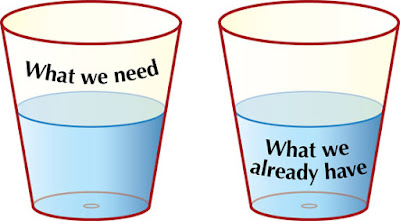Depression, as we know, is an illness of the mind. That being so, some view it as a condition that can be cured, or at least managed, by the power of the mind alone. In over-simplified terms, 'will ourselves into a happier state'.
In relation to non-clinical depression that most of us go through on occasions, there is merit to that.
In relation to non-clinical depression that most of us go through on occasions, there is merit to that.
For example, and not meaning to be facetious here, there's no point getting ourselves down over such an uncontrollable thing as the weather. If it's raining there's nothing we can do about it, but we can take measures to prevent ourselves getting wet all the same.
If it's our routine and work that has us at a low ebb, the old saying, 'a change is as good as a rest', might be the remedy. That's perhaps easier for some to do than others; it depends on our education, employment position, financial standing and suchlike. (It must be noted here that it is, generally speaking, those who have access to more opportunities who tend to find themselves thinking this way.)
Yet for others, whether it's momentary depression or one that has been clinically diagnosed, the place of residence plays its part. That is to say they're content at what they are at, but they feel they're doing it in the wrong place, usually inhabited by people not quite of their ilk.
In such a scenario, simply willing yourself out of this delicate mental state is nigh on impossible. You basically have to get up and go to feel happier, but the get-up-and-go required to do that is often lacking, especially in major depression cases.
In milder instances, a short break from our normal environment does the trick; the key is to take them regularly. (For the record, while we like Bogotá, getting out of the metropolis is needed every now and again.)
 |
| Happiness isn't always just in the mind; the place plays its part, too. |
Yet for others, whether it's momentary depression or one that has been clinically diagnosed, the place of residence plays its part. That is to say they're content at what they are at, but they feel they're doing it in the wrong place, usually inhabited by people not quite of their ilk.
In such a scenario, simply willing yourself out of this delicate mental state is nigh on impossible. You basically have to get up and go to feel happier, but the get-up-and-go required to do that is often lacking, especially in major depression cases.
In milder instances, a short break from our normal environment does the trick; the key is to take them regularly. (For the record, while we like Bogotá, getting out of the metropolis is needed every now and again.)
For most working- to middle-class people, regardless of marital status or offspring to cater for, escaping on a regular basis for short periods is doable.
It's a far more complicated issue, though, if you feel no love at all for where you are, to the point that the actual place and people are the chief reasons for your depressed state, yet you have a significant other who is content there and has no desire to leave. An immovable object meets an unstoppable force. Either a compromise is reached or the relationship is pretty much doomed.
There are those who say that love conquers all and if it doesn't then it wasn't meant to be. Perhaps that's the case. 'If you loved me enough you'd live with me even in hell' kind of thing.
It's a far more complicated issue, though, if you feel no love at all for where you are, to the point that the actual place and people are the chief reasons for your depressed state, yet you have a significant other who is content there and has no desire to leave. An immovable object meets an unstoppable force. Either a compromise is reached or the relationship is pretty much doomed.
There are those who say that love conquers all and if it doesn't then it wasn't meant to be. Perhaps that's the case. 'If you loved me enough you'd live with me even in hell' kind of thing.
However, staying in a place you detest for the sole purpose of maintaining a long-standing relationship, and one that seemed solid at that, certainly doesn't seem like the key to a life full of happiness.
Finding that happy state isn't always a matter of mind over mud, so to put it. On occasions that mud you're treading on plays a big part, for better or for worse.
Finding that happy state isn't always a matter of mind over mud, so to put it. On occasions that mud you're treading on plays a big part, for better or for worse.
_______________________________
Facebook: Wrong Way Corrigan - The Blog & IQuiz "The Bogotá Pub Quiz".
Facebook: Wrong Way Corrigan - The Blog & IQuiz "The Bogotá Pub Quiz".
